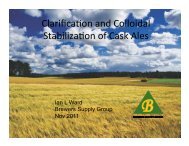Program Book - Master Brewers Association of the Americas
Program Book - Master Brewers Association of the Americas
Program Book - Master Brewers Association of the Americas
You also want an ePaper? Increase the reach of your titles
YUMPU automatically turns print PDFs into web optimized ePapers that Google loves.
Martin Biendl received a Ph.D. degree in organic chemistry from<br />
Regensburg University in 1990. Since <strong>the</strong>n, he has been employed<br />
at <strong>the</strong> Hallertauer Hopfenveredelungsgesellschaft in Mainburg,<br />
Germany. Since 1996, he has been head <strong>of</strong> <strong>the</strong> R&D/Analytical<br />
Department <strong>of</strong> this hop-processing company, which is part <strong>of</strong> <strong>the</strong><br />
international Hopsteiner group. He is <strong>the</strong> representative <strong>of</strong> <strong>the</strong><br />
International Hop Industry Cooperation (IHIC) in <strong>the</strong> EBC Analysis<br />
Committee and, since 2001, chair <strong>of</strong> <strong>the</strong> Hops Subcommittee. In 2007<br />
he was elected to <strong>the</strong> Board <strong>of</strong> <strong>the</strong> <strong>Association</strong> <strong>of</strong> <strong>the</strong> German Hop<br />
Trade.<br />
O-14<br />
About celiac disease and beer – 2<br />
MICHAEL LEWIS (1)<br />
(1) UC Davis Extension, <strong>Master</strong> <strong>Brewers</strong> <strong>Program</strong>, Davis, CA<br />
Celiac disease is a reaction <strong>of</strong> <strong>the</strong> gut lining to small peptides in <strong>the</strong><br />
diet formed during digestion <strong>of</strong> cereal gluten molecules, especially<br />
those <strong>of</strong> wheat. Barley also contains gluten, though much less than<br />
wheat, and because <strong>of</strong> significant modification in malting, and<br />
dilution with water and adjuncts during brewing, barley proteins<br />
only minimally survive into beer; as a result most beers test negative<br />
in rudimentary ELISA methods for detecting gluten fragments.<br />
Never<strong>the</strong>less most celiac patients follow <strong>the</strong>ir physician’s advice<br />
and eschew drinking beer, because <strong>the</strong> potential negative impact<br />
<strong>of</strong> ingesting gluten can be severe. For this reason <strong>the</strong>re is currently<br />
some interest in making gluten-free beers from approved nongluten-containing<br />
materials such as sorghum. While <strong>the</strong>re are many<br />
alternative beverages for beer drinkers to enjoy, <strong>the</strong>re is really no<br />
alternative for wheat-based foods and so physicians are exploring an<br />
enzyme that, taken along with such foods, prevents <strong>the</strong> formation<br />
<strong>of</strong> <strong>the</strong> gut-damaging gluten fragments. Given that brewers are<br />
well versed in managing cereal proteins and enzymes <strong>the</strong>re seems<br />
no reason why this enzyme should not be tried in beer-making<br />
processes.<br />
Pr<strong>of</strong>essor Emeritus Michael Lewis taught <strong>the</strong> program in brewing<br />
science at <strong>the</strong> University <strong>of</strong> California at Davis for 30+ years before<br />
retiring in 1995, and many former students now hold distinguished<br />
positions in <strong>the</strong> American brewing industry large and small.<br />
Pr<strong>of</strong>essor Lewis has been recognized by <strong>the</strong> university with <strong>the</strong><br />
Distinguished Teaching Award and by <strong>the</strong> industry with <strong>the</strong> MBAA<br />
Award <strong>of</strong> Merit and Life Membership. Pr<strong>of</strong>essor Lewis remains<br />
active in <strong>the</strong> industry; he is academic director <strong>of</strong> brewing programs<br />
in University <strong>of</strong> California Extension, where <strong>the</strong> <strong>Master</strong> <strong>Brewers</strong><br />
<strong>Program</strong>, which prepares students for <strong>the</strong> Institute <strong>of</strong> Brewing and<br />
Distilling examinations, is <strong>the</strong> flagship educational <strong>of</strong>fering.<br />
O-15<br />
The origin and transfer <strong>of</strong> silicon in beer<br />
TROY CASEY (1), Charles Bamforth (1)<br />
(1) University <strong>of</strong> California, Davis, CA<br />
Recently, silicon has been shown to be a healthy component <strong>of</strong><br />
beer. The silicon content <strong>of</strong> beer was investigated by analyzing<br />
brewing ingredients and samples throughout <strong>the</strong> brewing process<br />
using nitric acid/hydrogen peroxide/hydr<strong>of</strong>luoric acid microwave<br />
digestion and analysis by Inductively Coupled Plasma Atomic<br />
Emission Spectrometry (ICP-AES). Several popular brewing<br />
techniques were performed to determine what effects <strong>the</strong>se<br />
processes have on <strong>the</strong> extraction <strong>of</strong> silicon into <strong>the</strong> resulting beer.<br />
Commercial packaged beer samples were also analyzed with regard<br />
to beer style and origin to determine <strong>the</strong> silicon content.<br />
Troy Casey received his B.A. degree in chemistry from <strong>the</strong> University<br />
<strong>of</strong> Colorado, Colorado Springs. While in Colorado, he had <strong>the</strong><br />
opportunity to work with Bristol Brewing Company as a brewing<br />
apprentice and at Coors Brewing Company as an intern in <strong>the</strong><br />
Brewing Department and in <strong>the</strong> quality assurance labs. In 2006, he<br />
began working on his M.S. degree in food science at <strong>the</strong> University <strong>of</strong><br />
California, Davis, where he was able to work with Anheuser-Busch<br />
as a brewing group manager.<br />
71



